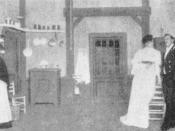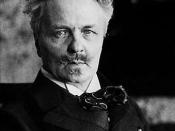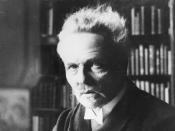In the preface to his play Miss. Julie, Strindberg states that a modern woman who tries to be equal to a man, "implies a retro-gressive step in evolution, an inferior species who cannot endure". (p 68, Strindberg) As is notable from this quote, Strindberg believed passionately in the inferiority of women to men, and his portrayal of this conviction in his female characters has made his name synonymous with misogyny. In this essay I will discuss how this becomes apparent in both Miss Julie and The Father.
In Miss. Julie, Miss Julie herself is the play's twenty-five-year-old heroine. Fresh from a broken engagement, which was ruined because of her attempt literally to train her fiancé like a dog; Miss Julie has become "absolutely crazy" (p 76, Strindberg), making shameless advances to her valet, Jean, on Midsummer Eve. In his preface to the play, Strindberg discusses what motivates Miss Julie: "her mother's primary instincts, her father raising her incorrectly, her own nature, and the influence of her fiancé on her weak and degenerate brain".
(p 65, Strindberg) He also cites as influences; the absence of her father, the fact that she is menstruating, the sensual dancing and flowers, and, finally, the man. Strindberg is interested in psychology, and this list is his diagnosis of what he considers Miss Julie's sickness. The symptoms of this sickness are similar to contemporaneous symptoms of the hysteric. Traditionally considered a female disease, hysteria in Strindberg's day was increasingly used to refer to a disturbance in female sexuality - namely, a woman's failure or refusal to accept her sexual desires. Strindberg probably meant for us to read Julie as a hysteric, for she is simultaneously disgusted and drawn to men, and is both nonsexual and seductive.
Raised by an empowered...


